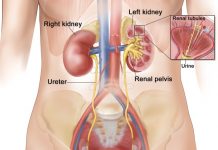Bladder cancer survival rates show the percentage rate of people diagnosed with bladder cancer and have survived in a span of 5 to 10 years regardless if they are already cured, still undergoing treatment or even if the cancer has recurred.
The table below will show you the percentage of bladder cancer survival rates based on a 5-year time frame.
Stage of Bladder Cancer Percentage Survival Rate
| Stage of Bladder Cancer | Percentage Survival Rate |
| 4 | 15% |
| 3 | 46% |
| 2 | 63% |
| 1 | 88% |
| 0 | 98% |
As the stage of the bladder cancer increases, the lower the bladder cancer survival rates will be. This is because cancer is easy to cure or remove while it hasn’t spread out yet to other internal body organs. 
Once detected early, bladder cancer survival rates are higher because the doctor will only need to focus on one area where the tumor has occurred.
On the contrary, if the cancer is already in its critical stage, it means the tumor has already spread out to other parts of the body and now requires complicated treatments and procedures which greatly reduce the patient’s bladder cancer survival rates.
If you are experiencing any symptom that indicates the presence of a tumor in your bladder, have yourself checked by a doctor at once to verify it. Once you’re diagnosed with bladder cancer ask the doctor what stage it’s in to know your bladder cancer survival rates.
If a person diagnosed with bladder cancer didn’t take the necessary treatments or if he found out the disease too late, this lowers his bladder cancer survival rates.
Cancer is a chronic disease and when it reaches its critical stage, not even the most expensive treatments can help increase his bladder cancer survival rates. They may provide relief from pain but they won’t guarantee to save you from your illness.
If you want to have an idea of your chances of having this disease, there are a number of risk factors of patients diagnosed with bladder cancer that could affect a person’s bladder cancer survival rates. Here are some of them:
- People who smoke especially tobacco users
- People aged 40 years old and above have higher chances of having bladder cancer
- People who are often exposed to carcinogens, usually workers from rubber, leather and chemical industries
- People who are infected by certain parasites found in tropical areas but not in United States
- People treated with arsenic or cyclophosphamide that is commonly used as an aid for cancer and other illnesses but researchers found out that this also increases the chances of having bladder cancer
- People who have a family history of this disease are likely to get it as well
- People who had bladder cancer have a bigger chance of getting it again
If you think you are likely to have bladder cancer, discuss this with your doctor so that proper preventive measures can be practiced to increase your bladder cancer survival rates. Change your lifestyle if needed by avoiding smoking and eating the right foods.











